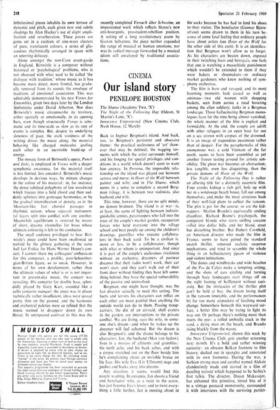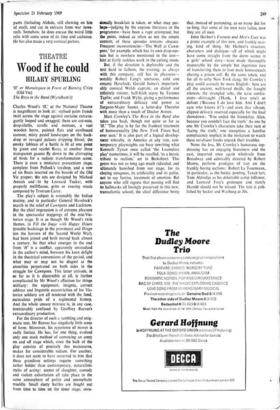CINEMA
Our island story
PENELOPE HOUSTON
The Shame (Academy Two, 'X') The Night of the Following Day (Odeon, St Martin's Lane, 'X') Innocence Unprotected (New Cinema Club, Nash House, 12 March) Back to Ingmar Bergman's island. And back, too, to Bergman's persistent and obsessive theme: the practical uselessness of 'art' (how- ever that may be defined), the nagging tor- ments with which the artist surrounds himself, and his longing for special privileges and con- ditions in a world which doesn't seem to want him anyway. In Persona, the impossible rela- tionship on the island was played out between actress and nurse; in Hour of the Wolf between painter and wife; and in The Shame, which seems in a sense to complete a second Berg- man trilogy, it is between two violinists, also husband and wife.
This time, however, there are no split minds. no demon birdmen. The island is at war—is, at least, the scene of fighting between indistin- guishable armies, paratroopers who fall into the trees of the couple's market garden, occupation forces who herd everyone into the village school and beat people up among the children's drawings, guerrillas who execute collabora- tors in their back yard. To be a civilian is, more or less, to be a collaborator; though with what or whom is unimportant. And since it is part of the couple's uselessness (violinists without an orchestra; dreamers of postwar dreams) that their radio won't work, their car won't start, and they can't walk out of their front door without finding they have left some- thing behind, they have the special vulnerability of the passive and uninvolved.
Bergman, one might have thought, was the last director actually to need this setting. The hurts and terrors his characters can inflict on each other are more painful than anything the outside world can do to them. Passing troop- carriers, the din of an air-raid, shell craters in the garden, are interruptions to the private conflict. We are living, says the wife, in some- 'one else's dream—and when he wakes up the dreamer will feel ashamed. But the dream is also Bergman's; and the shame belongs to his characters. Jan. the husband (Max von Sydow), lives in a morass of ailments and grumbles: his teeth ache, and his back aches, and with a corpse stretched out on the floor beside him he's complaining about an invisible bruise on his face. His wife Eva (Liv Ullmann) nags and pushes and backs away into dreams.
Any situation, it seems, would find this couple wanting. In extremis, Jan shoots a friend and benefactor who, as a twist to the screw, has just become Eva's lover; and to twist every- thing a little further, Jan is running about in his socks because he has had to lend his shoes to their visitor. The benefactor (Gunnar Bjorn: stfand) seems drawn to them in his turn be- cause of some fatal feeling that ordinary people have about artists (see Hour of the Wolf for the other side of this coin). It is an identifica- tion that Bergman won't allow us to forget. As his characters are beaten down, exposed in their twitching fears and betrayals, one feels that one is watching a masochistic punishment which wouldn't be extended to them if they were bakers or shoemakers—or ordinary market gardeners who knew nothing of sym- phony orchestras.
The film is bare and ravaged, and its most haunting moments look casual as well as ominous—two old women with shopping baskets, seen from across a road hovering among the alien soldiery; tanks in a Bergman landscape. Those hallucinating Bergman mono- logues have for the time being almost vanished; the whole manner of the film is explicit and formidable. At the end, the couple are adrift with other refugees in an open boat far out on a sea strewn with corpses of the drowned, It is an image of stupendous pessimism rather than of despair. For the paraphernalia of this anonymous war, a cold Vietnam of the fat north, seems to have been assembled as yet another frozen testing ground for artistic sen- sibility. The ghost war becomes an abstraction; less tangible. even less disquieting, than the private demons of Hour of the Wolf.
The Night of the Following Day is rather an alluring title for a distinctly eccentric film. Four crooks kidnap a rich girl, hole up with her in a windswept beach house, fall out among themselves, and,make the most atrocious hash of their well-laid plans to collect the ransom. The plot is par for the course; so are the kid- nappers—Marlon Brando's equivocally smiling chauffeur, Richard Boone's psychopath, the competent blonde who starts sniffing cocaine rolled into dollar bills, and her bland, stout but disturbing brother. But Hubert Cornfield, an American director who made the film in France. seems to have gutted the standard snatch thriller, removed realistic suspense mechanisms, and tried to scramble the whole thing in an hallucinatory jigsaw of violence and violent intimations.
he dunes and windbreaks and wide beaches of the Pas de Calais make a tempting setting, and the shots of cars circling and turning through hazy landscapes start things off on the right footing of bafflement without curi- osity. But the intricacies of the thriller plcit can't be held at bay, the dream losing itself in the ransom timetable, and the performances hit far too many airpockets of lurching mood change. Somewhere beneath this wayward stir- faCe, a better film may be trying to fight its way out. Or perhaps there's nothing more than meets the eye: a rolled umbrella stuck in the sand, a dying man on the beach, and Brando rising blackly from the waves.
Innocence Unprotected, shown this week by the New Cinema Club, gets another screening 'next month. It's a bold and rather winning curiosity: an obscure Balkan footnote to filth 'history, decked out in spangles and annotated with its own footnotes. During the war, a Serbian strong man and acrobat named Aleksic clandestinely made and starred in a film of dazzling naivete which happened to be Serbia's first talkie. The director, Dusan Makavejev, has exhumed this primitive, tinted bits of it to a vintage postcard monstrosity, surrounded it With interviews with the surviving partici- paats (including Alekvic, still chewing on bits of steel), and cut in extracts from war news- reels. Somehow, he does encase the weird little relic with some sense of its time and audience. He has also made a very comical picture.



































 Previous page
Previous page